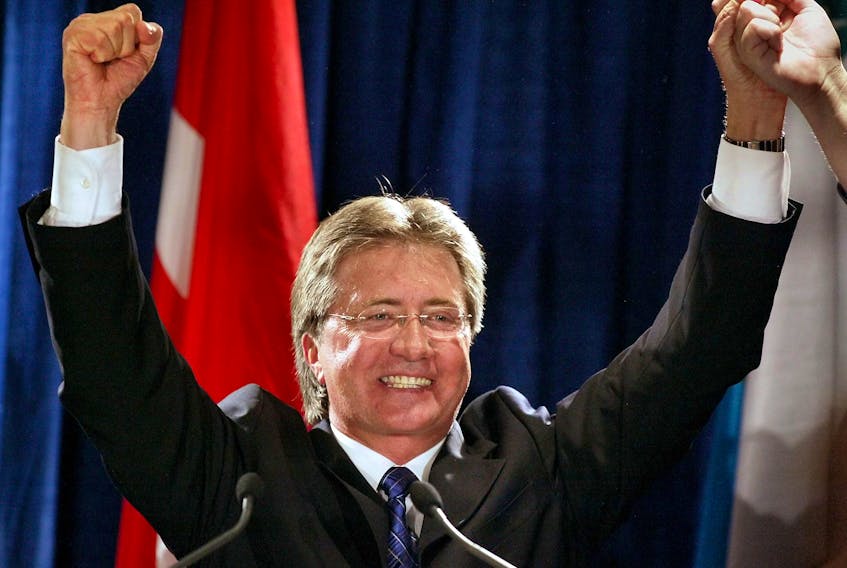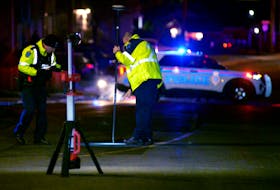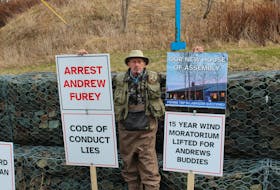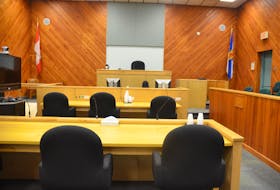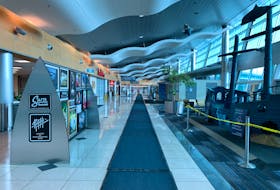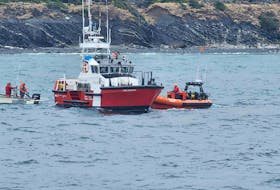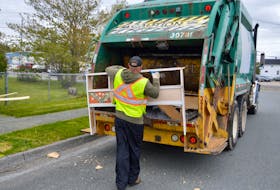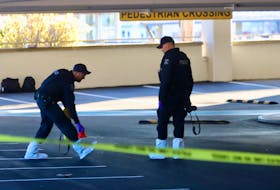The Telegram continues its look at the Top stories of the first two decades of the 21st Century.
Murderous mother
Thirteen-month old Zachary Turner was drowned by his mother, Newfoundlander Shirley Turner, in the waters off Topsail Beach in 2003. Turner also drowned herself. At the time, she was wanted in the U.S. to face trial for the murder of Zachary’s father, Andrew Bagby, who had been found shot to death in a park in Pennsylvania in 2001.
A review of Zachary’s death accepted by the province in 2006 concluded that Turner should not have had custody of Zachary, and that his death was preventable. The social services system in the province failed the little boy, the review found.
Due to the fight for legal changes to the Criminal Code of Canada by Andrew Bagby’s parents — David and Kate Bagby of California — in 2010, a new law changed the code to allow courts to refuse bail for suspects accused of serious crimes, when the suspect’s children may be in danger.

Murderous father
The killing of little Quinn Butt was tough for anyone to process, let alone her devastated family.
In 2019, a jury found that Trent Butt killed his five-year-old daughter, Quinn, and set fire to their Carbonear home.
On April 25, 2016, firefighters located Butt and Quinn lying in bed — she was already dead, while he was bleeding from self-inflicted wounds to the neck and wrist.
“I, for one, do not accept your apology,” Justice Donald Burrage told Butt, as he sentenced the man to life in prison. “Nor your expression of remorse, if that’s what it was.”
Police located a letter written by Butt in his truck, confessing to having taken his daughter’s life and indicating he had intended to take his own. Titled “Final Words,” the letter expressed animosity toward his ex-wife, Andrea Gosse, and blamed her for Quinn’s death.
“Did she cry? Did she beg him to stop? Did she cry for her mom? What did he think the outcome would be?” Gosse read from her victim impact statement at Butt’s sentencing.
“Does her voice haunt him, ringing in his ears with all the funny things she used to say? And how is it that he thought he had the right to decide whether she lived or died?”
Outside the courtroom, Gosse said she didn’t accept the apology Butt had issued in court for Quinn’s death.
“You can’t say, ‘I would never hurt my child,’ and smother her at the same time. That’s not love. You protect your child,” Gosse said.

Voisey’s Bay deal becomes official
In 2002, Inco Ltd. and the Newfoundland government signed a formal deal to develop the massive Voisey’s Bay mineral find in Labrador.
Discovered in 1993, the Voisey’s Bay deposit is thought to contain enough nickel, copper and cobalt to add $11 billion to the provincial economy over the estimated 30-year life of the mine.
The mine eventually fell under the company name Vale Inco when in 2006, Vale do Rio Doce acquired Inco.
In February 2015, a then-Progressive Conservative government announced an amendment to the Voisey’s Bay Development Agreement, allowing the company more time before it would be required to process product from its Labrador mine at the new hydromet production facility in Long Harbour.
The provincial government was criticized in 2015 for amending its agreement with Vale to allow the exportation of material from Voisey’s Bay in exchange for $200 million, without consulting the Nunatsiavut Government.
Danny Williams elected premier
He was nicknamed Danny Millions, the golden boy of the economic boom, a successful lawyer and businessman turned premier who donated his salary to charity.
As the millennium dawned, Danny Williams was considered a high-profile front-runner — a “white knight” to take on then Liberal Premier Brian Tobin, who subsequently moved on to federal politics.
In December 2000, he formally announced his Tory leadership intentions in a packed St. John’s hotel ballroom.
It took the prominent lawyer, Rhodes scholar, golf course proprietor and former owner of Cable Atlantic five minutes to reach the podium as he greeted Tories young and old to the thumping beat of “Eye of the Tiger,” a 1980s song by Survivor about rising up to meet challenges.
“At the end of the day, the most formidable judge and jury that I ever face will be the people of our province,” Williams declared after predicting the demise of the governing Liberals.
Former Tory cabinet minister Glenn Tobin, who introduced Williams, compared his leadership to a fast train.
“What’s that sound I hear? ... That sound is the thunder of the mighty Danny Williams Express beginning to roar to life,” Tobin said.
Indeed, Williams was acclaimed Progressive Conservative leader in early 2001, and went on to leave Liberal Leader Roger Grimes and NDP Leader Jack Harris in the 2003 election dust, as the PCs won 34 seats to the Liberals’ 12 and the NDP’s two.
In 2010, in his second term, Williams shocked many when he announced his abrupt retirement from politics, days after signing a tentative deal to develop part of the Lower Churchill hydro resource. Williams enjoyed sky-high approval ratings during his seven years in the premier’s office and his departure left PC Leader Premier Kathy Dunderdale in charge of both the province and the legacy of Muskrat Falls.

Gunned down in a public plaza
There have been many murders over the span of 20 years, each of them tragic.
But perhaps this one was the most shocking — Juliane Hibbs and her fiancé, Vince Dillon, were gunned down in public on Oct. 15, 2013, at the Villa Nova Medical Clinic in Conception Bay South.
The hunt for their killer ended the next morning when Brian Dawe, Hibbs’ former boyfriend, was found in a vehicle in the Anglican cemetery on Kenmount Road in St. John’s. He was wearing body armour, and had a 9 mm handgun, an AK-47 semi-automatic assault rifle and hundreds of rounds of ammunition in clips that carried more ammunition than was legally allowed.
A police statement said Dawe was in lawful possession of the firearms. An additional 43 weapons were seized from Dawe’s house.
The following month, Hibbs’ parents told The Telegram their daughter had lived in fear for 15 years, controlled and abused by Dawe. The family had finally reconnected when she left him and moved on with her life, only to be fatally hunted down by Dawe two years later.
The toll of Afghanistan
The war in Afghanistan killed 158 Canadians.
With Newfoundland and Labrador’s long history of military service, the province mourned a number of its own brave soldiers during the conflict, which stretched from 2002-11:
Corp. Jamie Brendan Murphy, originally from Conception Harbour, killed Jan. 27, 2004.
Sgt. Vaughan Ingram of Burgeo, killed Aug. 3, 2006
Warrant Officer Richard Francis Nolan of Mount Pearl, killed Sept. 3, 2006
Sgt. Craig Paul Gillam, from South Branch, killed Oct. 3, 2006
Pte. Kevin Vincent Kennedy, from St. Lawrence, killed April 8, 2007
Cpl. Stephen Bouzane, 26, from Springdale, killed June 20, 2007
Sgt. Donald Jason Lucas, from St. John’s, killed April 8, 2007
Pte. Justin Peter Jones, from Baie Verte, killed Dec. 13, 2008
Capt. Francis Cecil Paul from Badger, killed Feb. 10, 2010
Cpl. Brian Neil Calvin Pinksen of Corner Brook, killed Aug. 30, 2010
Cpl. Kenneth Chad O’Quinn, from Happy Valley-Goose Bay, killed March 4, 2009
Pte. John Michael Roy Curwin, from Baie Verte, killed Dec.13, 2008

Burton Winters tragedy
Burton Winters, 14, died after he went snowmobiling near Makkovik in Labrador in 2012. His body was found three days after he was reported missing. Search and rescue helicopters were not called to look for him until two days after the report was made.
The outrage that followed over how the search for Burton was handled led to calls for an inquiry.
It wasn’t until late 2018 that Premier Dwight Ball officially announced an inquiry would be established.
The province had been waiting on the findings of the federal Standing Senate Committee on Fisheries and Oceans’ study into maritime search and rescue for the province.
“These inquiry processes delve down deeply into how these things function. So, it’s not just totally centred on Burton for the family. They know there are other families that experience these type of losses, as well,” Winters family lawyer Tommy Williams said in 2018.
The Burton Winters inquiry was set for 2019, but had not started as the year closed.

Apology finally for Labrador residential school survivors
In 2017, survivors of residential schools in Labrador finally got an apology from the federal government through Prime Minister Justin Trudeau.
That’s after a snub almost a decade earlier — Prime Minister Stephen Harper apologized for the legacy of Canada’s residential school system in 2008, but Newfoundland and Labrador was left out.
Some 900 plaintiffs, who attended schools at Cartwright, North West River, Nain, Makkovik and St. Anthony after 1949 when Newfoundland joined Confederation, were involved in a settlement of $50 million approved by the Supreme Court of Newfoundland and Labrador in 2016 for physical and/or sexual abuse suffered at the schools, which were run by the International Grenfell Association and the Moravians.
More than 300 survivors attended the 2017 apology event.
“I always wondered if we would ever get the apology,” said Toby Obed, a residential school survivor among the crowd.
“While this long-overdue apology will not undo the harm done,” Trudeau said, “we offer it as a sign that we, as a government and as a country, accept responsibility for our failings. It is our shared hope that we can learn from this past and continue to advance our journey of reconciliation and healing. We have the power to be better and to do better.”
Twitter: @BarbSweetTweets
With files from current and past reporters, as well as columnists Pam Frampton, Brian Jones, Russell Wangersky and Steve Bartlett.
Stories that shaped N.L. in the 21st century: Part I
Stories that shaped N.L. in the 21st Century: Part 2
RELATED
- SPECIAL REPORT: The breast cancer testing scandal that shocked Newfoundland and Labrador led to sweeping change
- CAMERON REPORT: Donna Howell’s family left feeling shortchanged, 10 years after breast cancer testing scandal
- CAMERON REPORT: Elizabeth Finlayson remembered by her daughters
- CAMERON REPORT: Breast cancer testing scandal propelled passionate activism
- CAMERON REPORT: The breast cancer testing scandal in Newfoundland and Labrador affected many lives, including those working in the system that failed patients
- ANALYSIS: Muskrat Falls Inquiry evidence says we should demand better
- PAM FRAMPTON: Public the last to know the price of Muskrat Falls
- STEVE BARTLETT: Memories of 9-11 never fade
- For Brad Gushue, history is nice, but winning is what matters

